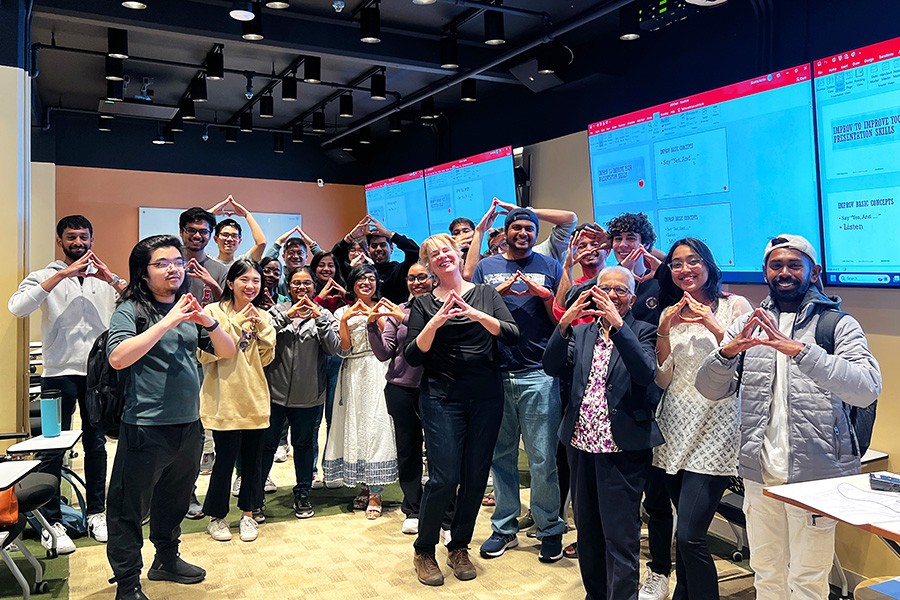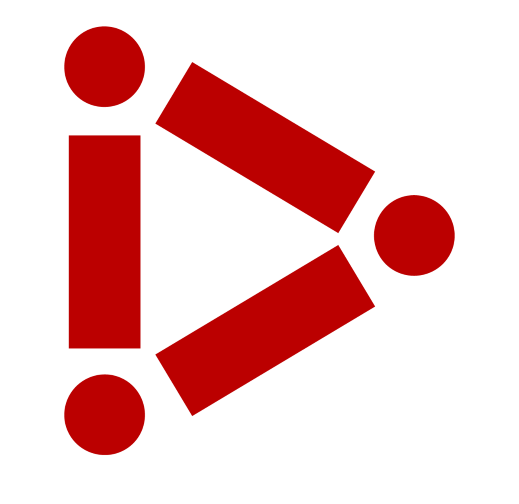
Students Build Professional Skills Through Improvisation Training
How the “Strategies for Your Industry Career” course improved students’ professional skills with an improv workshop
By Hannah Brelsford
Shantha Mohan, a professor at Carnegie Mellon University's Integrated Innovation Institute, knows that career success extends far beyond technical expertise. In her Strategies for Your Industry Career course—a core course in the Master of Science in Software Management program—she connects students with industry professionals who can share real-world insights about navigating career transitions and professional growth.
One such professional is Elaine Lung, an accomplished public speaker and active leader in the Toastmasters community—an organization dedicated to improving communication and leadership skills in individuals worldwide. When Shantha connected with Elaine through their shared involvement in Toastmasters, she recognized an opportunity to introduce her students to an unexpected but powerful skill set: improvisation.
Improvisation, often associated with the performing arts, also holds surprising benefits for product managers and entrepreneurs. Shantha saw how its core principles—spontaneity, active listening, and quick thinking—align closely with the communication demands of collaboration, building customer trust, and managing stakeholders in fast-moving tech environments.
Unlike traditional conversations where participants often wait for their turn to speak, improvisation demands complete engagement with others' contributions. Students discovered this level of active participation was challenging, as many had never experienced such intense, real-time collaboration before. With practice, these unscripted responses become increasingly polished and engaging, translating directly to more confident presentations and interactions.
This skill proves particularly valuable for product managers, who regularly navigate uncertainty and adapt to unexpected situations. Improvisation training teaches professionals to embrace ambiguity rather than fear it, transforming unpredictable moments from obstacles into opportunities for authentic connection and creative solutions.
In today's fast-paced work environment, professionals must be ready to adjust their work quickly and often under pressure. The workshop was designed to prepare students for the high-pressure situations that they will face throughout their careers, in the interview process, or in their daily work.
Great storytelling is a crucial skill in these moments. Although students prepare diligently for their interviews, they often encounter unexpected questions. Improvisation skills help students think on their feet and develop an appropriate and compelling response without appearing flustered. These skills also build confidence, demonstrating to students that they can handle unexpected situations gracefully.
Although familiar with improv, Shantha even found herself walking away from the workshop having learned more. She found it helpful to revisit these important skills, and more importantly, she found it special to see how the students responded.
Keerthi Raghavendra (MSSM ‘25) and Sahaana Das (MSSM ‘25) were two students involved in the workshop who found it beneficial for their personal and professional lives.
Keerthi, who was the head of the theater club in her undergraduate years, enjoyed integrating previous and new skills in this workshop to upskill. At first, she didn’t expect improv to be that relevant to product thinking, but soon, she realized that was a misconception, as the improv skills that go into acting are quite aligned with skills that are necessary within product development.
She also noticed that she and her classmates were building off each other's "creative momentum." This experience changed her approach to teamwork; it became less about pushing her own ideas forward and more about uplifting others' ideas and contributing to them collectively. This mindset has remained with her since the workshop and has deepened her appreciation for collaboration, particularly the importance of trusting others to expand on her ideas and to share their own.
This experience also helped her rewire her brain to embrace uncertainty instead of fearing it. In improvisation, there is no right way to respond; it's about giving your best in the moment. Keerthi aims to incorporate this mindset into her product development skills.
Sahaana had a transformative experience in which a workshop changed her perspective on the industry. She adopted the principle of “yes, and…” introduced during the workshop, enhancing her ability to accept the uncertainty that often accompanies teamwork.
While some areas of the business industry emphasize having the perfect plan, improvisation highlights the importance of effective communication tools that allow for real-time adaptability. It encourages leveraging unexpected moments to create better solutions. By embracing this approach to product development, Sahaana is setting herself up for greater success in the future. By preparing for the unexpected, she is cultivating invaluable skills that many others may not possess.
Q&A with the Students
Which improv skill surprised you most regarding its business or professional application? Why?
Keerthi: “I didn’t expect improv to be so relevant to product thinking, but one exercise really hit home for me. We had to start with one idea - no matter how absurd - and everyone had to agree and build on it. By the end, we had created an entire hypothetical product from scratch. It was wild how natural that process felt, yet in product management and business, we often resist ideas instead of running with them. The exercise made me realize that in real-world scenarios, especially in early-stage brainstorming or customer discovery, you don’t always get to tear things down, you have to build on what’s there. That shift in mindset stuck with me.”
Sahaana: “The ability to embrace uncertainty and "yes, and..." was most surprising. In the business world, we often focus on having the perfect plan, but improv taught me that accepting and building upon unexpected ideas leads to more creative solutions and stronger collaboration.”What was your favorite part of the workshop?
Keerthi: “Definitely the product-building exercise. Seeing how quickly we could turn a random idea into something tangible by just saying “yes, and…” showed me how powerful creative momentum can be. It made me wonder how many ideas in the real world get shut down too early just because someone said “no” too soon.”
Sahaana: “My favorite part was the scene work, where we had to create spontaneous stories with others. It was both challenging and fun, and it helped me realize how much creative potential exists in collaborative, unscripted moments.”Did the workshop make you more confident thinking on your feet? How?
Keerthi: “Yes, because it rewired my brain to embrace uncertainty rather than fear it. The exercises taught me that there’s no “right” answer, just the best response you can give at the moment.”
Sahaana: “Absolutely! Improv taught me to stay present and adapt quickly to unexpected questions or situations. This has made me more comfortable during interviews and presentations, knowing I can respond confidently without overthinking.”This workshop pushed Keerthi and Sahanna out of their comfort zones by requiring them to perform without a script or notes. Initially, the concept of zero preparation made them both nervous. However, throughout the process, they learned to trust themselves and their communication skills.
These skills also enhanced their teamwork and problem-solving abilities by encouraging them to be open-minded and engage in active listening, which is essential in improv. This willingness to embrace diverse perspectives is key for success in product management. While many might not see the connection between improv and product management, flexibility and adaptability to an ever-changing environment are crucial components of success in this field.



